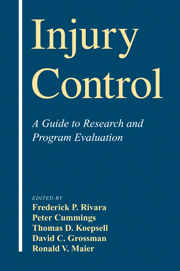Book contents
- Frontmatter
- Contents
- List of Contributors
- 1 An Overview of Injury Research
- 2 Classifying and Counting Injury
- 3 Measurement of Injury Severity and Co-morbidity
- 4 Data Linkages and Using Administrative and Secondary Databases
- 5 Rates, Rate Denominators, and Rate Comparisons
- 6 Data Collection Methods
- 7 Selecting a Study Design for Injury Research
- 8 Qualitative Methods in Injury Research
- 9 Randomized Trials
- 10 Cohort Studies in Injury Research
- 11 Case–Control Studies in Injury Research
- 12 Ecologic Studies
- 13 Case Series and Trauma Registries
- 14 Systematic Reviews of Injury Studies
- 15 Evaluating an Injury Intervention or Program
- 16 The Development of Clinical Decision Rules for Injury Care
- 17 Trauma Performance Improvement
- 18 Measuring Disability and Quality of Life Postinjury
- 19 Economic Evaluation of Injury Control
- 20 Ethical Issues
- Index
17 - Trauma Performance Improvement
Published online by Cambridge University Press: 16 October 2009
- Frontmatter
- Contents
- List of Contributors
- 1 An Overview of Injury Research
- 2 Classifying and Counting Injury
- 3 Measurement of Injury Severity and Co-morbidity
- 4 Data Linkages and Using Administrative and Secondary Databases
- 5 Rates, Rate Denominators, and Rate Comparisons
- 6 Data Collection Methods
- 7 Selecting a Study Design for Injury Research
- 8 Qualitative Methods in Injury Research
- 9 Randomized Trials
- 10 Cohort Studies in Injury Research
- 11 Case–Control Studies in Injury Research
- 12 Ecologic Studies
- 13 Case Series and Trauma Registries
- 14 Systematic Reviews of Injury Studies
- 15 Evaluating an Injury Intervention or Program
- 16 The Development of Clinical Decision Rules for Injury Care
- 17 Trauma Performance Improvement
- 18 Measuring Disability and Quality of Life Postinjury
- 19 Economic Evaluation of Injury Control
- 20 Ethical Issues
- Index
Summary
Introduction
Professionals involved with trauma care, and medicine in general, are being asked to adopt new standards of accountability as a major societal responsibility. In addition to traditional accountability for the highest standards of care for each individual patient (trauma audit), there is an increasing need to demonstrate the efficacy and cost-effectiveness of medical practice in health systems and entire patient populations. This has led to the development of the field of performance improvement.
Performance improvement is the continuous evaluation of a system and the providers through structured review of the process ofcare as well as the outcomes. Performance improvement has evolved from previous quality assurance paradigms and represents a more scientific and evidence-based continuation of those standards. The goal of performance improvement is to ensure that trauma centers and trauma systems design processes to monitor, analyze, and improve performance systematically with the ultimate intent of improving patient outcomes. The primary focus has been shifted to the assessment of whole processes – not isolated individual components of care. A performance process may reside entirely within a department, but major processes will include several departments or disciplines. A process may be narrowly defined and formalized, or it may be fairly loose and informal. In order for performance improvement to occur, processes need to be (1) planned and designed, (2) monitored by means of ongoing data collection, (3) analyzed to determine process effectiveness, and (4) implemented with a commitment for sustained activity and improvement. Continuous monitoring, analysis, and sustained improvement are the key elements in ongoing performance improvement efforts (O'Leary, 1995).
Keywords
- Type
- Chapter
- Information
- Injury ControlA Guide to Research and Program Evaluation, pp. 236 - 249Publisher: Cambridge University PressPrint publication year: 2000

